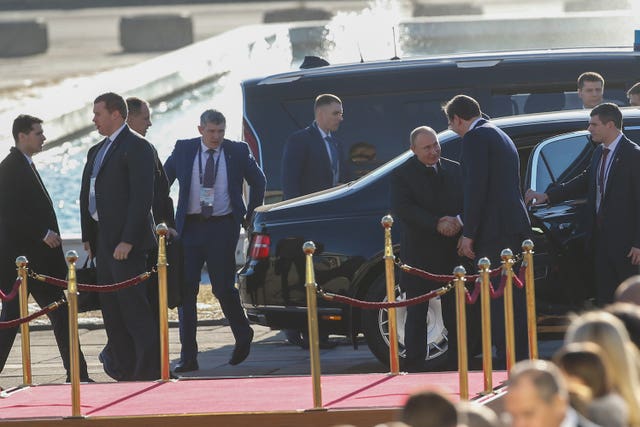
Issuing an international arrest warrant for Russian president Vladimir Putin will have negative consequences and will only prolong the war in Ukraine, Serbia’s president has said.
The International Criminal Court issued the warrant for the Russian leader on Friday, accusing him of war crimes.
The ICC accused Mr Putin of bearing personal responsibility for the abductions of children from Ukraine during Russia’s full-scale invasion of its neighbour that started almost 13 months ago.
But Serbian populist president Aleksandar Vucic, who had in the past boasted about his personal relation with the Russian leader, criticised the court’s decision.

“I think issuing an arrest warrant for Putin, not to go into legal matters, will have bad political consequences and it says that there is a great reluctance to talk about peace (and) about truce” in Ukraine, Mr Vucic told reporters in Belgrade.
“My question is now that you have accused him of the biggest war crimes, who are you going to talk to now?” Mr Vucic said.
“Do you really think that it is possible to defeat Russia in a month, three months or a year?” he asked, adding: “There is no doubt that the goal of those who did this is to make it difficult for Putin to communicate, so that everyone who talks to him is aware that he is accused of war crimes.”
Asked if Mr Putin would be arrested if he comes to Serbia, Mr Vucic said that it is “a pointless question, because it is clear that as long as the conflict (in Ukraine) continues, Putin has nowhere to go.”
Although Serbia is seeking European Union membership, it has maintained close ties to Russia and is the only European state that has refused to join international sanctions against Moscow.
Mr Vucic, a strong opponent of international war crimes courts, was a ranking official of an ultra-nationalist party whose leader Vojislav Seselj and several other members ended up in the international war crimes court on trials for crimes they committed during the wars in the 1990s.
In the late 1990s, Mr Vucic was information minister in the government of Serbian president Slobodan Milosevic during the war in Kosovo where Serb troops were accused of various war crimes committed against Kosovo Albanian separatists.
Mr Milosevic was arrested in Serbia on war crime charges in 2001. He died at the international war crimes court in the Hague in 2006 before his trial on the crimes committed by Serbian troops during the wars in the Balkans in the 1990s ended.


Why are you making commenting on The National only available to subscribers?
We know there are thousands of National readers who want to debate, argue and go back and forth in the comments section of our stories. We’ve got the most informed readers in Scotland, asking each other the big questions about the future of our country.
Unfortunately, though, these important debates are being spoiled by a vocal minority of trolls who aren’t really interested in the issues, try to derail the conversations, register under fake names, and post vile abuse.
So that’s why we’ve decided to make the ability to comment only available to our paying subscribers. That way, all the trolls who post abuse on our website will have to pay if they want to join the debate – and risk a permanent ban from the account that they subscribe with.
The conversation will go back to what it should be about – people who care passionately about the issues, but disagree constructively on what we should do about them. Let’s get that debate started!
Callum Baird, Editor of The National
Comments: Our rules
We want our comments to be a lively and valuable part of our community - a place where readers can debate and engage with the most important local issues. The ability to comment on our stories is a privilege, not a right, however, and that privilege may be withdrawn if it is abused or misused.
Please report any comments that break our rules.
Read the rules here